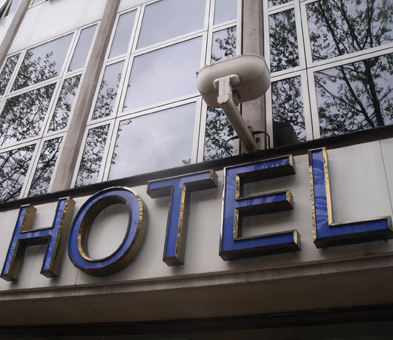Are you in the process of running – or do you already own – a hotelier business? There are – of course – plenty of factors to consider to ensure a successful hotel business. Depending on which market you are tapping into, there will be different ways to make your establishment stand out from the crowd. This will likely require extensive research into nearby properties and businesses to see exactly what is working and what isn’t.
Despite the variable nature of the industry, safety is one aspect which should be a consistent consideration for any hotel. Your guests’ safety is paramount to your business. Here, we offer a brief overview of how you can help to safeguard your hotel:
CCTV
Installing CCTV is an ideal way to make guests feel safe. However, just having a surveillance system in place isn’t enough. Be sure to constantly monitor your set-up, even if this means hiring a third-party company to do so. Certain systems also come with a voice command option, which means that if you spot any wrong-doing, you can quickly warn those involved to stop their actions. You could even use an IP CCTV system, so that you can view your property from a control room, smartphone or a tablet 24/7.
Electric
Electricity is always a potential source of danger. When it comes to your electricity supply – it’s crucial to have a regular Electrical Installation Condition Report (EICR) conducted. This is because, since your business is constantly in operation, your systems can be subject to wear, tear, corrosion and overloading. This report, which must be carried out by a qualified electrician, will ensure that the electrical appliances in each room are fit for purpose. Electrical checks should be carried out periodically (diarise them). Doing this will ensure you are limiting the risk of electrical shocks, fires and accidents, therefore reducing accidents in the workplace – something which is a legal requirement since the introduction of the Electricity at Work Regulations 1989.
Gas
Gas safety should be another on your list of priorities. Similar to your electricity supply, your gas installation and appliances should be periodically checked. The Gas Safety Regulations 1998 states that you must arrange annual gas safety checks for any appliances that are serving guest accommodation, even if it’s sited away from the guests’ rooms.
Keep staff updated in terms of your gas safety policy. Make sure staff have full training in the operation of any gas appliances – and this should include spotting any obvious faults, by using visual checks. This could include any damaged pipework or connections. While any new installations must be carried out by someone who is Gas Safe-registered, anyone can change a LPG gas cylinder or hose once they are competent to do so. It’s vital to install carbon monoxide and dioxide alarms. These alarms can signify any fault and help you avoid any catastrophes. They should give an audible alarm when levels are dangerous and should be able to automatically shut off your gas system.
Your emergency response plan?
Would your staff know their roles in the event of an emergency? Hopefully it will never happen, but if there is an emergency then your staff should be fully up-to-date about what they need to do in the scenario. Regular meetings with law enforcement and emergency services should be scheduled so you have a good communication plan in place and can update it as and when required. In doing so, you can prepare your staff so that everyone is calm and knowledgeable in a worst-case scenario.
Staff uniform
This might seem obvious (although isn’t always the case!) but putting a staff uniform policy is a good idea. Not only does it help your business look professional and smart, but it also gives your guests a clear view of who they can approach about a query, and who indeed is allowed in certain areas of the business. In guest areas, knowing who members of staff are is essential. This is because it shows that your company have guests’ safety at the forefront due to staff always patrolling the areas.
Online data
Don’t just think about physical security. Hotels have become a prime target for cyber attacks. According to a report by PwC, the hospitality industry has the second-highest number of cybersecurity breaches, with most of the prominent hotels in the industry having fallen victim to breaches.
Do keep on top of IT. Regularly update your IT systems – doing this will help to ensure the safety of files and information, and reduce online data security risks. You should also be making sure that backing up your data becomes a habit, so you can eliminate the risk of losing it or having it irretrievably damaged. A recommended strategy is to use a cloud service daily, have weekly server backups, and follow these up with quarterly server backups and then yearly backups.
Another potentially obvious one, but it’s surprising how many businesses are not password vigilant. Remember, password security is important, just as it would be for your personal devices. Be sure to change it often and make sure you change it any time a staff member leaves to avoid any breaches.
There are many aspects to consider for any hotelier, but safety should obviously be a key consideration. Following the above steps should help provide your business with insight on how to keep your guests – and business – safe.









